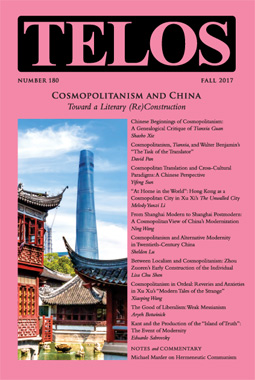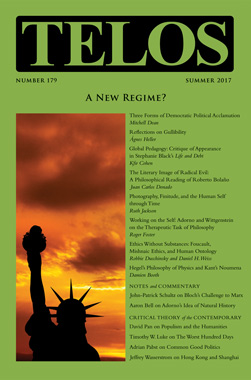By Sheldon Lu · Friday, September 29, 2017 Sheldon Lu’s “Cosmopolitanism and Alternative Modernity in Twentieth-Century China” appears in Telos 180 (Fall 2017), a special issue on Cosmopolitanism and China. Read the full article at the Telos Online website, or purchase a print copy of the issue in our online store. Individual subscriptions to Telos are now available in both print and online formats.
My essay joins the revisionist project of rewriting modern Chinese intellectual history. The historiography of modern China usually foregrounds the theme of nationalism in the grand narrative of China’s arduous struggles for liberation, anti-imperialism, anti-colonialism, and anti-capitalism. Radical breaks from the Chinese tradition or from the outside world have occurred in the form of a series of earth-shaking revolutions throughout the twentieth century: the Republican Revolution that overthrows the Qing Dynasty in 1911; the Communist Revolution that leads to the founding of the People’s Republic in 1949; the Cultural Revolution (1966–1976); and so forth. Amidst the fiery rhetoric of revolution, the voice of a conciliatory, non-revolutionary, mild cosmopolitanism could be easily muffled. This essay attempts to re-examine the discourse and practice of cosmopolitanism in twentieth-century China.
Continue reading →
By Ning Wang · Wednesday, September 13, 2017 Telos 180 (Fall 2017) is now available for purchase in our store.
 In Western as well as international academia today, along with the acceleration of globalization more generally, humanities scholars have constructed a sort of theoretical discourse of globalization. In doing so, they have found it useful to refer to the old-fashioned philosophical concept of cosmopolitanism, which is very close to the theoretical construction of the discourse of globalization. Although it has previously been discussed over the history of Western philosophy, cosmopolitanism is once again a cutting-edge theoretical topic. The term nowadays frequently appears in the works of political philosophers and sociologists, and it is increasingly being taken up and debated by literary and cultural studies scholars as well, particularly with regard to the rise of world literature as the highest phase of comparative literature. Obviously, most of their work interprets and deals with cosmopolitanism from the perspectives of political philosophy and culture, while touching to some degree upon literary and cultural production and criticism. Moreover, most of the scholarship dealing with cosmopolitanism only occurs within a Western context. In this respect, the present special issue of Telos may well fill a gap in international cosmopolitanism scholarship. The recent interest in world literature in the field of comparative literature is undoubtedly associated with the rise of cosmopolitanism in the contemporary era. In the articles collected here, cosmopolitanism will mainly be addressed from literary and cultural perspectives, and, more importantly, they will move beyond the limits of Eurocentric or West-centric ways of thinking and modes of research by dealing exclusively with cosmopolitanism and China: its parallel relations with ancient Chinese philosophy, its impact on modern Chinese literature and intellectual thought, and its recent significance to China’s modernization and globalization. In Western as well as international academia today, along with the acceleration of globalization more generally, humanities scholars have constructed a sort of theoretical discourse of globalization. In doing so, they have found it useful to refer to the old-fashioned philosophical concept of cosmopolitanism, which is very close to the theoretical construction of the discourse of globalization. Although it has previously been discussed over the history of Western philosophy, cosmopolitanism is once again a cutting-edge theoretical topic. The term nowadays frequently appears in the works of political philosophers and sociologists, and it is increasingly being taken up and debated by literary and cultural studies scholars as well, particularly with regard to the rise of world literature as the highest phase of comparative literature. Obviously, most of their work interprets and deals with cosmopolitanism from the perspectives of political philosophy and culture, while touching to some degree upon literary and cultural production and criticism. Moreover, most of the scholarship dealing with cosmopolitanism only occurs within a Western context. In this respect, the present special issue of Telos may well fill a gap in international cosmopolitanism scholarship. The recent interest in world literature in the field of comparative literature is undoubtedly associated with the rise of cosmopolitanism in the contemporary era. In the articles collected here, cosmopolitanism will mainly be addressed from literary and cultural perspectives, and, more importantly, they will move beyond the limits of Eurocentric or West-centric ways of thinking and modes of research by dealing exclusively with cosmopolitanism and China: its parallel relations with ancient Chinese philosophy, its impact on modern Chinese literature and intellectual thought, and its recent significance to China’s modernization and globalization.
Continue reading →
By Russell A. Berman · Monday, June 12, 2017 Telos 179 (Summer 2017) is now available for purchase in our store.
 When the historian Ken Burns spoke at the Stanford University commencement last June, he delivered an exceptionally political address, including an attack on what he labeled the “Vichy Republicans.” Those Republican leaders who had not distanced themselves from candidate Trump, so Burns, were the equivalent of the Vichy French who collaborated with Hitler. That master metaphor, comparing 2016 to 1933, has continued into the new administration, with the anti-Trump camp labeling itself as “the resistance.” Despite Burns’s historiographical authority, one might question the validity of the underlying equation. No doubt the policies of the Trump administration are more conservative than those of Obama—hardly surprising—but the paradigms of the totalitarianism of the twentieth century are not necessarily the most adequate theoretical tools to analyze early twenty-first-century political phenomena. As emotionally satisfying as it may be for some to try to relive battles of earlier decades, Critical Theory ought to try to do better. We may very well be entering a different political era, a new regime, and not only in the United States. Can we describe it more effectively? When the historian Ken Burns spoke at the Stanford University commencement last June, he delivered an exceptionally political address, including an attack on what he labeled the “Vichy Republicans.” Those Republican leaders who had not distanced themselves from candidate Trump, so Burns, were the equivalent of the Vichy French who collaborated with Hitler. That master metaphor, comparing 2016 to 1933, has continued into the new administration, with the anti-Trump camp labeling itself as “the resistance.” Despite Burns’s historiographical authority, one might question the validity of the underlying equation. No doubt the policies of the Trump administration are more conservative than those of Obama—hardly surprising—but the paradigms of the totalitarianism of the twentieth century are not necessarily the most adequate theoretical tools to analyze early twenty-first-century political phenomena. As emotionally satisfying as it may be for some to try to relive battles of earlier decades, Critical Theory ought to try to do better. We may very well be entering a different political era, a new regime, and not only in the United States. Can we describe it more effectively?
Continue reading →
By Telos Press · Friday, February 10, 2017 Constitutional Theory as Cultural Problem:
Global Perspectives
January 19–21, 2018
New York, NY
The International Center for Critical Theory and the Telos-Paul Piccone Institute will jointly host a conference entitled “Constitutional Theory as Cultural Problem: Global Perspectives,” to be held at New York University, New York, from January 19–21, 2018.
The challenges faced by the liberal democratic model in the 21st century have made constitutional theory into an urgent topic of global concern. Both the second Iraq War and the revolutions of the Arab Spring frustrated hopes of an easy trajectory toward liberal democratic constitutional orders. If there was the hope that liberation would mean the establishment of liberal democracy, the result has been that emancipation from tyranny does not naturally lead in a particular political direction. Such a conclusion presents fundamental problems for a constitutional theory that is built around a liberal democratic model.
Continue reading →
By Flaminia Incecchi · Wednesday, January 4, 2017 David Pan’s “Carl Schmitt on Culture and Violence in the Political Decision” aims at challenging the widespread view that Carl Schmitt’s decisionism is motivated by violence and pure power. Pan presents his readers to “another Schmitt” that has escaped the attention of many commentators, including Müller, Žižek, McCormick, and Agamben. For Pan, Schmitt’s decision must not be separated from spiritual ideals and cultural values.
Continue reading →
By Göran Adamson · Thursday, March 3, 2016
In today’s public life, marked by large-scale migration, welfare states under pressure, and a soaring right-wing scene, “multiculturalism” and “right-wing populism” remain at the center of political debate. It is assumed, moreover, that they stand in sharp opposition to one another. On the one hand, multiculturalism is widely acclaimed for being progressive, radical, and safely leftist. It is seen as a vital precondition for a modern society: tolerant, humble, and anti-racist. Anyone who opposes multiculturalism, then, will be deemed at best a conservative or reactionary—if not outright racist, xenophobe, nationalist, or fascist. On the other hand, we have right-wing populism. Due to its allegiance with racism, virulent nationalism, and fascism, right-wing populism has a dubious reputation. Multiculturalism, as it seems, is anything that right-wing populism is not.
Continue reading →
|
|




